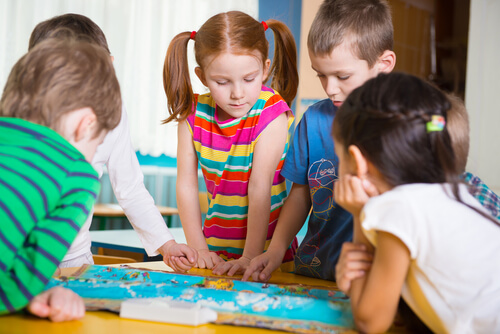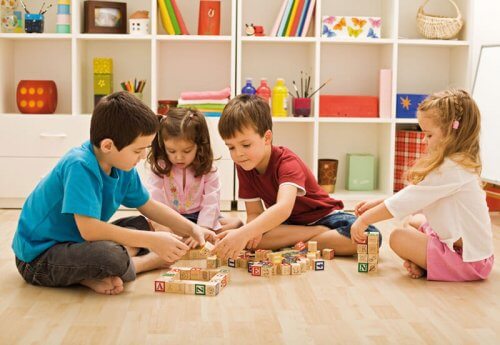Teach Your Children How to Lose, Give Them Opportunities to Grow


Written and verified by the psychologist María Alejandra Castro Arbeláez
Learning how to lose is an important lesson in life. That’s why it isn’t a good idea to always let your child win.
By always allowing your child to win, you’ll be taking away opportunities from them to grow. They’ll also have a tough time in the future.
Losing gives children opportunities to grow
It’s normal for parents to have a tendency to make things easier for their children. This in itself is not negative, as long as it’s done in moderation.
Otherwise our natural need to protect our children will turn into harmful overprotection. If everything is made easy for a child, it could have negative consequences on their personality.
Most parents have allowed their children to win at one point or another, yet the truth is this isn’t the best solution.
Sometimes we start a game with our children and then pretend to lose so they don’t become sad or angry. When this occurs what we’re actually doing is depriving them of excellent opportunities to grow.
When children win they feel a pleasant sense of empowerment. However, these feelings aren’t always appropriate.
By allowing them to win, we may be taking away chances for them to develop psychological strategies to deal with defeat and failure in life. Children should also be allowed to experience the feelings that arise from defeat.

Undeserved victories have negative effects
According to a study conducted by the University of Virginia on children between the age of 4 and 5, it was concluded that children who are given undeserved victories end up having a disproportionate perception of their abilities that doesn’t conform to reality.
This can lead to unfavorable consequences from a psychological point of view.
If children believe they’re successful while performing a certain task when it isn’t really so, they’re less likely to obtain information that will help them to continue developing their skills.
This in turn impedes their learning abilities. When a task is continuously facilitated for the child, the child may not see the importance of learning. If they always have someone that will solve their problems, they won’t try to solve anything on their own.

The effectiveness of learning how to lose
Here are a few reasons why it’s important for children to learn how to lose:
- Learning how to lose helps protect and reinforce their self-esteem. If the child learns how to lose, they won’t see defeat as something personal or as a lack of abilities. The child will understand that defeat is normal, they can’t always win. Therefore, when they lose, it won’t affect their self-esteem.
- Allowing the child to lose will also improve their social skills. They will be able to participate and play with good sportsmanship. If they lose, they won’t get upset.
- In addition, allowing the child to lose can help the child focus more on the activity that they’re performing, rather than on the results. Therefore, the child will understand how to enjoy the process rather than worrying about winning or losing.
- The child should understand the value of effort. Success comes from effort and not from luck.
The importance of developing tolerance towards frustration
These lessons will help your child develop tolerance towards frustration. They won’t get frustrated easily if they learn to see obstacles as challenges.
This will allow them to handle adversity without falling apart, which will make them stronger adults.
Children who understand that losing is an option, are also more likely to cooperate and help others.
They will understand that winning isn’t the most important thing, and this will prevent them from being competitive and selfish in the future.
Learning how to lose will also help your child form a more realistic self-image. This will allow them to face their challenges in a better way. The child will become aware of their abilities, potential and limitations.
Parents should treat the concepts of victory and defeat openly in their households. Smaller children can be introduced to these concepts through stories and tales.
You can help convert your child’s defeats into victories. Achieving this is easier than you think, all you need to do is validate their feelings by focusing on the positives.
For example, tell them that even though they lose, they shouldn’t feel bad because they enjoyed their time playing.
If you teach your child that losing isn’t negative but rather an occasion to learn and try again, you’ll be teaching them a useful lesson that will guide them even through adulthood. Above all, you’ll be giving them useful opportunities to grow.
All cited sources were thoroughly reviewed by our team to ensure their quality, reliability, currency, and validity. The bibliography of this article was considered reliable and of academic or scientific accuracy.
- Pérez Hernández, N. (2019). Programa de intervención para la mejora de la tolerancia a la frustración en niños con altas capacidades. https://riull.ull.es/xmlui/bitstream/handle/915/14618/Programa%20de%20intervencion%20para%20la%20mejora%20de%20la%20tolerancia%20a%20la%20frustracion%20en%20ninos%20con%20altas%20capacidades.pdf?sequence=1
- Montero López, M. (2020). Autoconcepto, autoeficacia y tolerancia de la frustración: en niños con y sin dificultades de aprendizaje. https://ebuah.uah.es/xmlui/handle/10017/43551
- Hurtado, M., & Cruz, P. (2015). Manejo de frustración en los niños. Armonía centro psicológico infantil. https://se-humanitas.com.mx/autoadministrable/PDF/formacion_padres/07.pdf
This text is provided for informational purposes only and does not replace consultation with a professional. If in doubt, consult your specialist.








